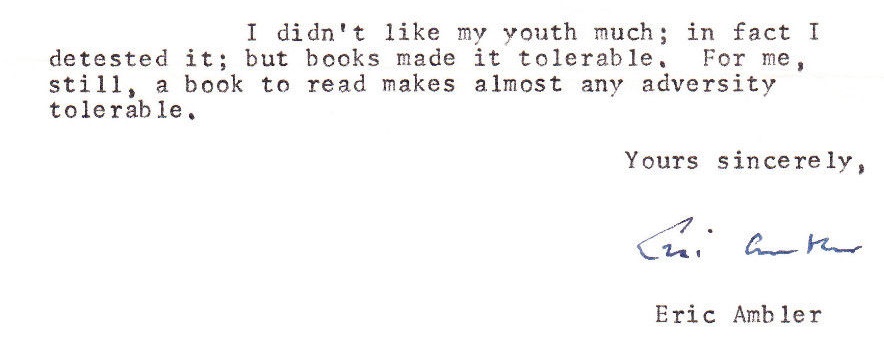About
Eric Ambler
Eric Ambler was born in 1909 to a warm, slightly chaotic, family of entertainers who ran a marionette show in South-East London. His parents were both music hall performers and he grew up surrounded by creatives and performers. Before embarking on a career as a writer, Ambler had an eclectic early working life that saw an abortive attempt at a career in electrical engineering leading to a role in advertising after a press release he wrote praising the false qualities of a batch of dodgy car headlight bulbs led to a massive increase in sales.
He published his first novel in 1936 and his reputation rapidly grew, enabling him to turn to writing full time. His first novel, The Dark Frontier, is unlike his other work. It was originally created as a parody of contemporary British thrillers, which Ambler considered flawed and outdated owing to poor characterisation. He judged them to have implausible villains, either “power-crazed or coldly sane”, and one-dimensional, unrealistic heroes: “All he really needed to function as hero was abysmal stupidity combined with superhuman resourcefulness and unbreakable knuckle bones.” Following the First World War, British thrillers (and their characters) had become unequivocally right-wing and nationalist in tone. The Dark Frontier overtly ridiculed this style of novel and yet many of the contemporary readers took the novel at face-value, with reviews describing it as a “genuine thriller”. Ambler took note, and so his next novels began to incorporate his genuine ideologies, played straight. This signature style became Ambler’s literary calling card and these subsequent books have been credited as completely transforming and revitalising the genre.

In the months before the Second World War, with six successful novels already under his belt, Ambler was struggling to focus on the next. So, he wrote a handful of short stories to pass the time. He was a man-in-waiting: not only for war, but to marry his American fiancé, Louise Crombie, a fashion correspondent.
When war broke out, Ambler joined the army, believing that proactively volunteering would be more likely to secure him an ultimately less lethal posting. Upon learning that he wrote novels for a living, the army recruiting officer asked him: “But is there anything you can actually do?” So, Ambler was assigned to the Army Film Unit, a division tasked with recording military events. His first task was a project to explain the best way to pack a landing craft. The army production team was told: “You don’t have to make it entertaining. People will be forced to look at it!” Nevertheless, they had access to noteworthy talent to make the films, such as Carol Reed, Peter Ustinov, and David Niven.
Later the division was handed over to the Directorate of Army Psychiatry: “Not for treatment!” as Ambler wryly noted in a later interview. These propaganda films focused on the lower ranks - “Oh, we were all for subversion” - and Ambler even made an appearance as an actor playing a gunnery instructor. His most famous creation from this period was his screenplay for the feature film The Way Ahead, following a group of civilians conscripted into the British Army and fighting in North Africa.
In 1957, Ambler moved to Los Angeles. During his eleven years there, he scripted several iconic films, such as the Oscar-nominated feature The Cruel Sea, and A Night to Remember. As well as these adaptations, he wrote original screenplays, such as mystery film noir The October Man, and the 1960 American detective TV series Checkmate. He divorced Louise Crombie in 1958 and, later that year, married Joan Harrison, a writer who wrote or co-wrote many of Alfred Hitchcock’s screenplays. Alfred Hitchcock himself organised their wedding.
Ambler continued to write fiction, completing a total of nineteen novels in his career, many of which were later adapted into films. At the height of his career Ambler earned handsome sums for his novels - and even more for their film rights – which afforded him homes in Bel Air and Switzerland, befitting of his status as a “mover and shaker”. In 1960 he was awarded the Crime Writers’ Association Gold Dagger Award for Passage of Arms.
Ambler enjoyed the success and sparkle of his youth but, in later life, he chose to spend much of his time out of the public eye, relocating to a quieter life in Switzerland. He resisted the endless appeals from publishers and producers to create “another Dimitrios”: he believed there was simply no need for one. Ambler was widely known to be warm, charming and a keen observer of people. A happy and fulfilled man, he lived his final years in London where he died in 1998, four years after his second wife, Joan.



